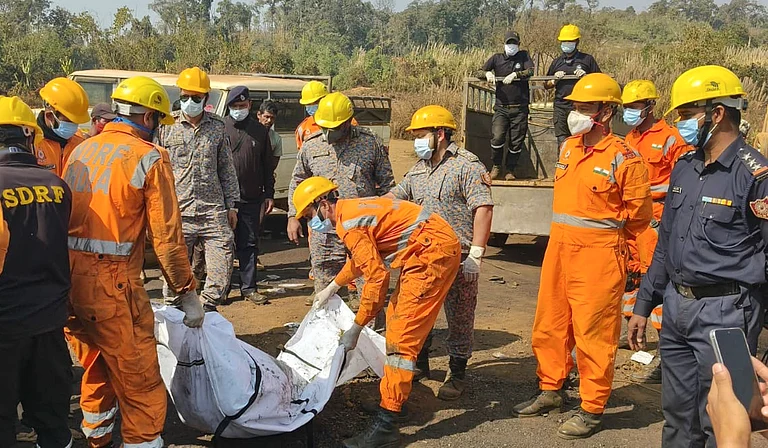THEIR faces proclaim their predicament. Women of varying ages united by a common tragedy: each is an abandoned wife, cast away by a Muslim male exercising his "religious" privilege to divorce. After suffering in silence for decades, these women have finally found a voice. On June 16, talaq victims gathered together at Manjeri in Muslim-dominated Malappuram district and founded Nisah, an organisation which pledges to fight for the rights of oppressed Muslim women.
They mostly inhabit the coastal belt of Malabar in North Kerala where female exploitation in the name of the Shariat is most acute. Nisah's headquarters is at Kozhikode, where the beaches are dotted by slums. The men are usually fishmongers or sawmill workers. The women work as maids in middle-class homes in the city. Life is a struggle: water and electricity are scarce; sewers are exposed; children defecate in the open. But more insidious than the rigours of poverty perhaps is the status of women. Here, the Shariat turns into a legitimate means of female oppression.
In house after house, there are battered women, all victims of male brutalisation. Women compelled into marriage at adolescence and discarded soon after, or after years of menial domestic subjugation, stranded penniless. Ever so often, the man scoots off with his wife's jewels after setting up a small business with the dowry money she has paid him. Or simply abandons her for a younger woman.
The forces of orthodoxy have abetted the exploitation of women by ignoring the rampant abuse of the Shariat laws. This has left the victims too weak-willed to fight back for fear of social and religious sanctions. Recourse to the law is not viable. Most of the afflicted women are either too poor to afford legal redress or simply have no access to legal aid services.
But awareness has been steadily growing. In the past, Muslim women from the poorer sections have paraded the streets of Kozhikode in protest against this exploitation in the name of religion. In a rare show of solidarity, even Muslim women from affluent homes have marched with placards denouncing the marriage and divorce laws that discriminate against females. But these sporadic protests failed to coalesce into any organised movement.
That opportunity may have presented itself with the formation of Nisah, a nascent solidarity movement committed to the emancipation of Muslim women. Nisah, which means woman in Arabic, took shape in the aftermath of a tumultuous seminar organised by the State Women's Commission in Kozhikode in early June to discuss the problems faced by Muslim women. The hardcore conservative lobby, represented at the seminar by the Jamait-i-Islami and the Muslim League, turned militant when talaq victims strode up to the podium and aired their grievances. The meeting broke up in bedlam, but it had provided a forum for Muslim divorcees to focus on their predicament.
One of the speakers was V.P. Suhara, a talaq victim and the prime motivator behind Nisah. Her tale of woe is typical of such divorces. She was married off by her parents at the age of 14 and was divorced within four years. Her husband sent her back to her parents without citing a reason. She bore him two children.
Suhara was forced to marry again. This time, the man was 20 years older and had 10 children. The marriage lasted till her husband's death 11 years ago. Since then, she has been a widow. She has a son from this marriage. After her husband's death, Suhara immersed herself in social work, interacting with other abandoned wives and their children. Like many other victims, she is bitter about the rabid forces in her faith. "If you approach a Kazi and ask for a 13-year-old bride, he will probably get you one."
Nisah will especially cater to children of talaq victims. Orphanages and children's homes are crammed with inmates fathered by Muslim men who divorced their wives and whose children are not welcome in the new homes. And because their own mothers are not able to maintain them, many of the children go vagrant. The juvenile wing of the police often picks up truant children from railway stations and bus stops and whisks them off to children's courts. Orphanages often refuse to admit such children on the grounds that their fathers are not deceased.
Nisah aims to build awareness among the poor and illiterate Muslim women and eventually eradicate some of the more heinous practices that they are subjected to. A case in point is "chadanguvivaham" or ritual remarriage, whereby a divorced couple seeking to reunite can do so only after the girl remarries, has conjugal relations with her new husband and is then divorced by him. "These practices are not prescribed by the Shariat but occur under Muslim Personal Law," Suhara pointed out.
This distinction between the Shariat and the Personal Law is the bone of contention of the warring sides. Says advocate Ananda
Kanakam, a member of the advisory board of Nisah who works with talaq victims: "Nisah is not opposed to the Shariat. It seeks changes in the Muslim Personal Law which deviates from the Shariat." Radicals uphold the Shariat, saying that the Muslim system of marriage does not discriminate against women. Conservatives like the Muslim League regard the Shariat and the Personal Law as synonymous. But Nisah's objective includes reform of the Personal Law on the questions of polygamy, child marriage and divorce. It wants divorce to be brought under the purview of the family courts.
Clearly, the Muslim community is in a state of ferment. The forces of orthodoxy are being challenged by a hitherto mute section—Muslim women have issued a notice to their male oppressors.


























